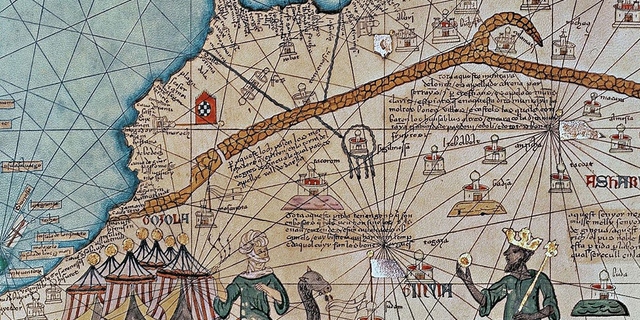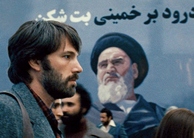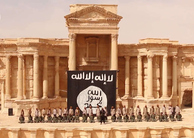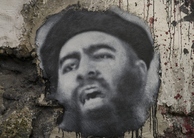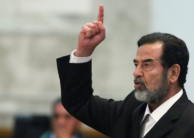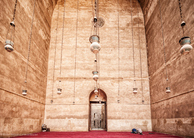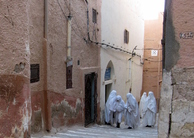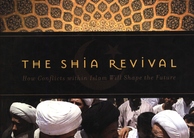|
Islam (tagged articles)
The keyword Islam is tagged in the following 34 articles.
2020, Vol. 12 No. 10
The fifteenth-century Middle English romance "The Sultan of Babylon" partakes in the Orientalist literary tradition through the poet's linguistic economy of the Other. The paradoxical shortages and surpluses of ethnic descriptors of East female... Read Article »
2020, Vol. 12 No. 10
In this essay, I provide a content analysis of commercially and critically successful films that perpetuate popularized Islamophobia, which is often masked as irreconcilable religious and cultural difference although it has in fact been consistently... Read Article »
2017, Vol. 10 No. 2
The global network of the Islamic State of Iraq and Syria (ISIS), also known as Daesh,2 is expanding rapidly. Southeast Asia is especially vulnerable because of its large Muslim population and its history of extremist groups. In fact, some experts... Read Article »
2017, Vol. 9 No. 01
From the 1980s to the parliamentary and presidential elections of 2011 and 2012, the Muslim Brotherhood in Egypt out-performed the secular opposition movements during that time. Explanations for this are varied, with scholars claiming that it is... Read Article »
2016, Vol. 10 No. 1
In the past five years, millions of people have lost their homes, loved ones, and lives.2 The Syrian territory is now a battlefield, contested by multiple actors. The rise of the Islamic State underscores the hopeless nature of this bloody quagmire... Read Article »
2016, Vol. 2016 No. 2
This paper evaluates the ethical dilemma coalition forces had to face when deciding to target and take out ISIL's primary source of revenue – oil. By gathering the impacts ISIL has had on the globe as well as the impacts aerial attacks could... Read Article »
2016, Vol. 8 No. 11
The Islamic State of Iraq and Syria (more commonly known as “ISIS,” but also referred to as the “ Islamic State of Iraq and the Levant” or simply “the Islamic State”) has been on a reign of terror in the Middle... Read Article »
2016, Vol. 8 No. 11
The so-called Islamic State of Iraq and Syria (ISIS) – also known as ISIL, IS and Daesh – has during the last years disseminated videos throughout the Internet in a new recruitment and media strategy focusing on the destruction of cultural... Read Article »
2016, Vol. 8 No. 09
Understanding the term 'terrorist' is a complex and controversial issue within both academic scholarship and mainstream literature. By adopting a post-structuralist approach to the study of 'terrorism,' we are able to dissect the terms and understand... Read Article »
2016, Vol. 8 No. 05
It is a common misperception that Islamist organizations are men’s groups. Some, like the Muslim Brotherhood, even involve specifically gendered names, or include other references to “brothers” and “brotherhood.” Beyond... Read Article »
2016, Vol. 6 No. 2
Though somewhat counterintuitive given terrorist organizations' clandestine nature, such organizations do engage in strategic alliances and partnerships with one another. A handful of scholars have grappled with terrorist alliances, but a gap in... Read Article »
2016, Vol. 9 No. 2
Ambassador Paul Bremer of the Coalition Provisional Authority, America's interim government between Saddam's fall and the independent establishment of a new Iraqi government, issued two specific orders during his term which combined to create a... Read Article »
2015, Vol. 7 No. 11
A review of literature on social movements highlights its many and sometimes conflicting definitions. Relying on Saba Mahmood’s Politics of Piety (2005) – an ethnographic account of grassroots women’s piety movement in the mosques... Read Article »
2015, Vol. 7 No. 08
Since Independence, the Indian government has struggled to achieve political modernity within acceptable religious boundaries. Religious diversity in India necessitates governmental sensitivity toward sometimes opposing principles, and yet, when... Read Article »
2015, Vol. 7 No. 07
The civil war in Syria has taken an enormous toll on civilian populations. One of the most commonly overlooked aspect of this crisis is the impact on healthcare in the region. Syria’s health capacity has been ravaged by years of government... Read Article »
2015, Vol. 8 No. 2
On August 20, 2013, Al Jazeera America televised its first official broadcast amidst a frenzy of speculation about the Qatari-backed news channel’s viability in the American media market. Scores of media commentators, ranging from reporters... Read Article »
2015, Vol. 7 No. 03
Violence against women has recently become well recognized as a violation of human rights that holds worldwide significance. Unfortunately, violence against women outside of North America has gone largely unnoticed among the academic community and... Read Article »
2013, Vol. 7 No. 1
Turkey and Iran are both predominately Muslim-populated countries with a history of powerful political leaders who have shaped their societal values and perceptions towards capital punishment. Until the 1920s both countries employed a fairly punitive... Read Article »
2013, Vol. 5 No. 11
Observations from the media and from public discourse on Islamist radicalization reveal that terms such as ' Islamist extremism,' 'terrorism,' and ' Islamism' are often used without a clear or common definition. The same can be said for the use of... Read Article »
2013, Vol. 5 No. 09
Islam has been under siege since 2001 and in today's political environment, Muslims are too often associated with terrorism. The heinous attacks of 9/11 were treated by the U.S. not as crimes – which would require criminal prosecution and... Read Article »
2012, Vol. 6 No. 1
Islamic banking and finance have become increasingly widespread over the past two decades, particularly in Muslim-majority countries in the Middle East, North Africa, and Southeast Asia. This paper uses country-level data to examine how growing... Read Article »
2012, Vol. 4 No. 09
The United States’ education system is unprepared to discuss Islam, despite the pertinence of religious education in the modern world. With the events of September 11, 2001, the words “Muslim” and “ Islam” have become... Read Article »
2012, Vol. 4 No. 09
Ibn Khaldun highlighted that societies in their natural state exist in the rural countryside, where the struggle of daily life binds kinsmen together (Abdullah, 2012a). Defining this strong familial bond as “asabiyya,” he stated that... Read Article »
2012, Vol. 4 No. 04
In his book The Shia Revival: How Conflicts within Islam Will Shape the Future (2006), Vali Nasr addresses an issue that is gaining increased importance in the contemporary coverage of global Islam: Sunni-Shia relations. Vali Nasr is a widely respected... Read Article »
2012, Vol. 2011/2012 No. 2
This could be referring to Nazi propaganda from the 1930s. However, it is, in fact, an ideology that is gaining influence in contemporary Europe. This time, allegedly, it is not Jews that have a plan to take control over Europe; it is Muslims. The... Read Article »
2011, Vol. 3 No. 04
Following a successful war of liberation in 1962, Algeria successfully gained independence from France and an authoritarian social regime took power. The success of this government lasted into the 1980s, when Algeria's oil reserves began to decline... Read Article »
2011, Vol. 4 No. 2
This paper traces and analyzes the organizational evolution of al-Qaeda from the late 1980s to the present day. It notes that al-Qaeda initially exhibited a hierarchical system and then adopted a hub network approach. Following 9/11 and the U... Read Article »
2010, Vol. 2 No. 06
"When can we expect a pro-Western, pro-business government in Iran?" asks a US government official in the quasi-fictitious film Syriana. Today, it is highly probable that the same question is still being asked by anxious diplomats the world over... Read Article »
2010, Vol. 2 No. 05
Under the rule of the Sultan Abdul Hamid II in the late nineteenth century the concept of Pan- Islamism, the concept that all Islamic peoples should unite under the Caliphate, was used as a means of supporting the declining power of the Ottoman ruler... Read Article »
2010, Vol. 2 No. 05
By the nineteenth and early-twentieth centuries, a large part of the Muslim world had begun to lose much of its cultural and political sovereignty to Christian occupiers from Europe. This came as a result of European trade missions during earlier... Read Article »
2010, Vol. 2 No. 05
The position of Jewish and Christian peoples under the Ottoman Empire is an issue that continues to be disputed today, almost a century after the official end of the Empire itself. Religious association typically determined status in the predominantly... Read Article »
2010, Vol. 2 No. 03
From skimpy skirts to smoldering skivvies, American’s remember the 1960s as a decade of social change and assertion of the rights and strengths of women. True to American style, the women’s movement was fought and won boldly and bluntly... Read Article »
2010, Vol. 2 No. 02
The Chechen people have endured a long history of aggression, culminating at the end of the twentieth century during which a separatist struggle against Russia began, triggering the First Chechen War in 1994. At the onset of the Second Chechen War... Read Article »
2007, Vol. 1 No. 1
These four nations showcase the state of Islamism as a political force in the Middle East. Because of differing political circumstances in each state, the impact and viability of following Muslim law varies. In order to best explain why this is... Read Article »
Expedited Article Review
Submit an article and get a decision fast.
If you need a fast decision, INQUIRIES Journal offers expedited processing of your submission for a small fee. Depending on the expedited review option you choose, you can receive a decision in as few as 5-days.
In addition to a shorter review period, the fee supports the journal's continued operation and open-access publishing model. Standard submissions are always free. Submit Now » - Submit an Article to Inquiries Journal -
|

